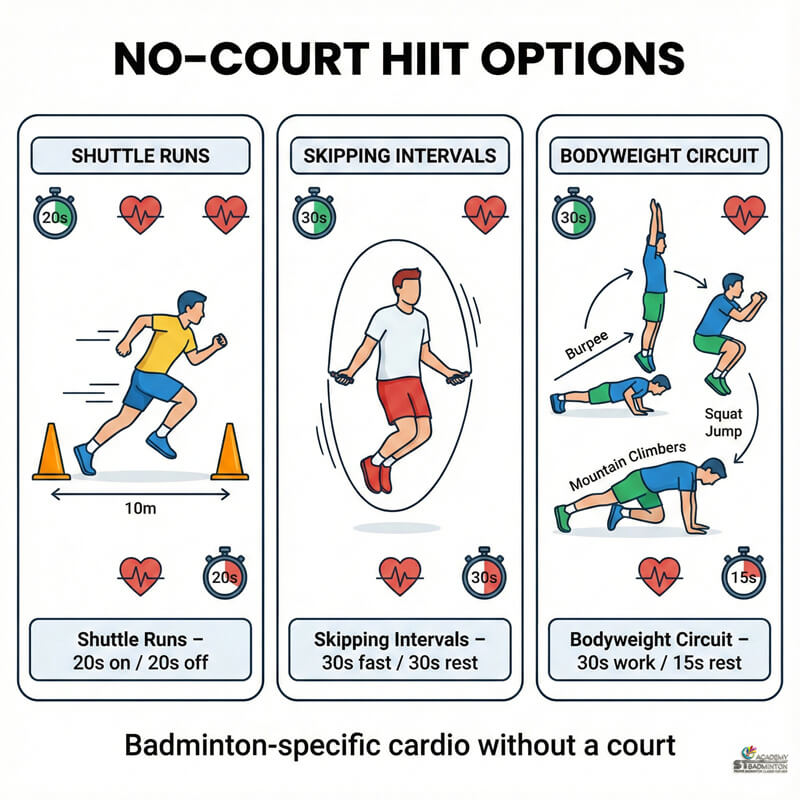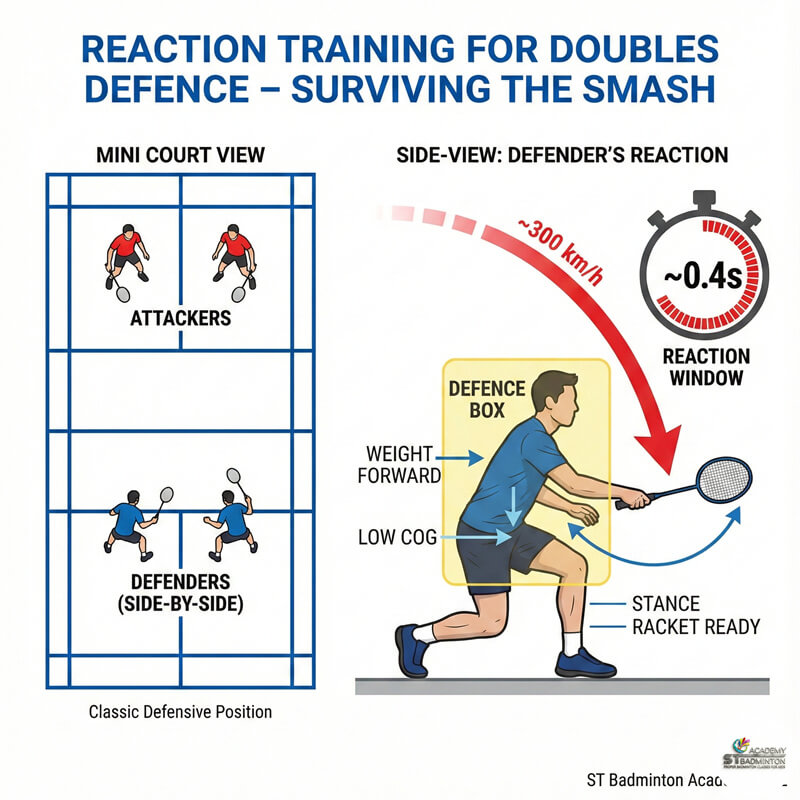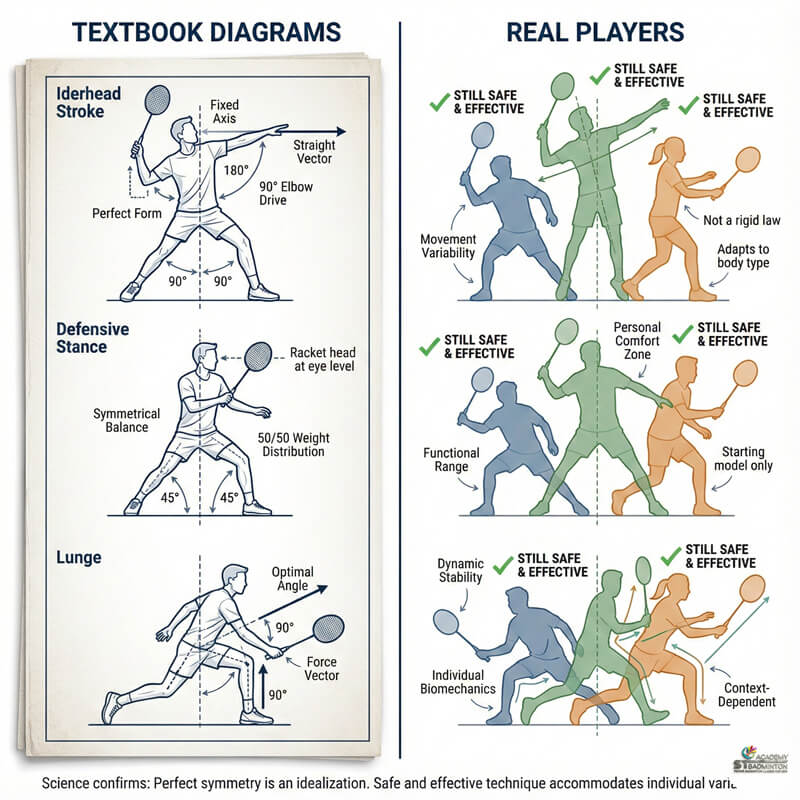Badminton or Screen Time? How Training Builds Focus, Confidence and Better School Habits (Malaysia Guide)
As a coach, many parents tell me they worry about phone addiction and long screen time affecting their children’s focus. The short answer is that regular badminton training offers a powerful alternative, giving kids structured movement, clear routines and positive peer interaction that can improve focus, confidence and study discipline. It works because the fast paced nature of badminton demands constant attention, while structured practice teaches goal setting, listening to feedback, and managing time skills that transfer directly to schoolwork. This guide is for families in Kuala Lumpur, Selayang, Kepong, Cheras, and Air Panas who are deciding on the right balance between badminton vs screen time. But an honest note: sport is not a miracle cure. The best results come from steady routines, proper sleep, and strong parent support at home.
A badminton coach explains how structured training routines help Malaysian kids reduce screen time and build focus, confidence and healthier study habits.
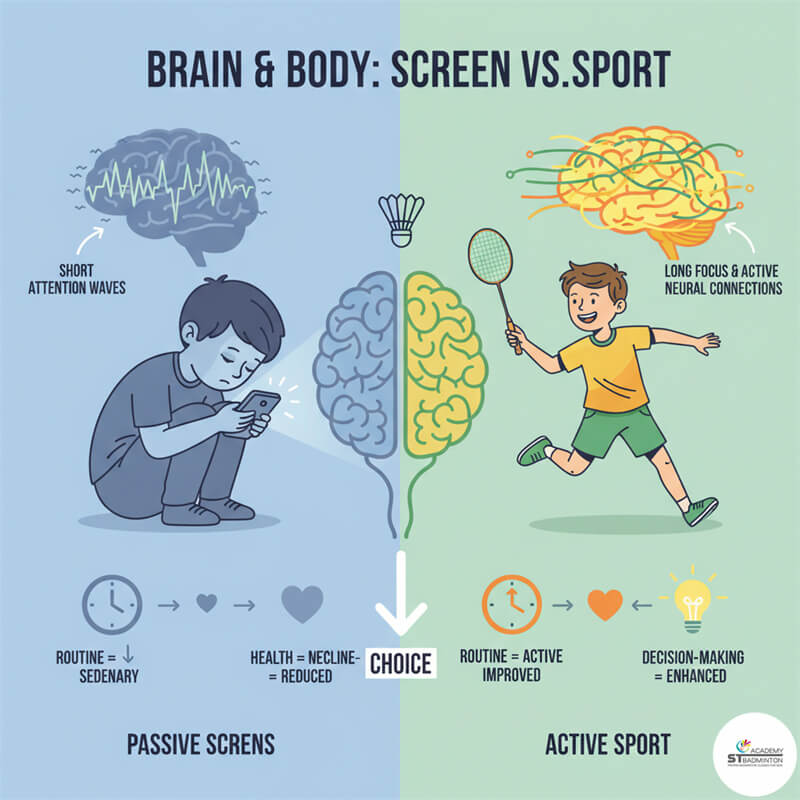
Active Sport vs. Passive Screens
Why Training is a Better Habit Than Mindless Scrolling
Screen time is often passive; a child sits still and consumes content. Badminton is the opposite it is fast, interactive, and demands constant decision making. Every shot requires a child to react, anticipate, and move, actively engaging their brain and body. This is a key difference in the debate of badminton vs screen time. Mindless scrolling doesn’t build any real world skills, but hitting a shuttlecock improves coordination and reaction time.
More importantly, training creates healthy routines. A typical schedule might be: badminton practice → shower → simple dinner → a short study block → sleep. This structure replaces hours of unstructured screen time with productive activity. The team setting also builds social skills and a positive mood, which can reduce resistance to doing homework later. This is how we can reduce phone addiction with sports by replacing an empty habit with a fulfilling one.
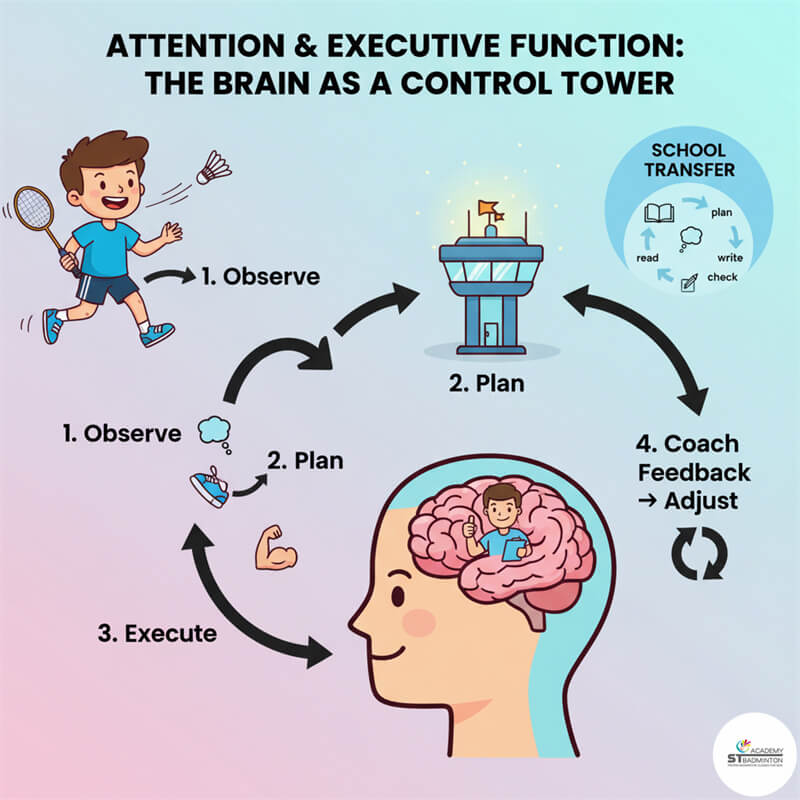
Attention & Executive Function
Building Focus That Helps in School
Badminton is excellent for training attention. Simple drills require a child to focus on a single task, like watching the shuttle and moving their feet, which strengthens their ability to concentrate. This is how badminton helps kids focus in a very practical way. They must listen to the coach’s instructions, observe a demonstration, and then try to repeat the action themselves.
This process creates a “feedback loop.” The coach provides a correction (“lift your elbow higher”), and the child adjusts. This teaches a plan do review cycle that is essential for effective learning in school. Remembering the score, understanding the court lines, and following the rules also build working memory and self control. These are key executive function skills that help with everything from copying notes from the board to checking their maths homework.
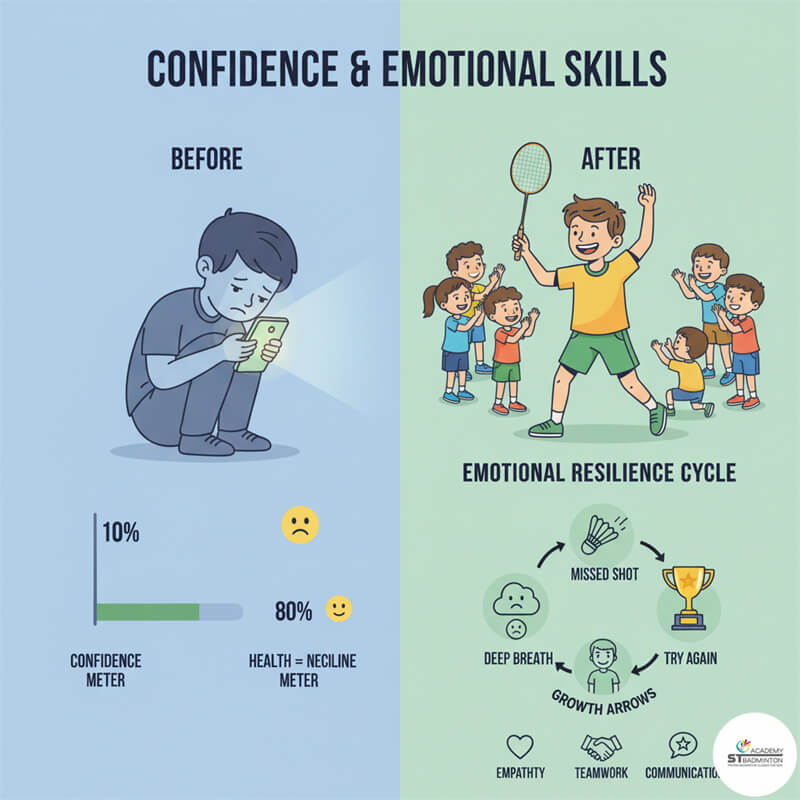
Confidence & Emotional Skills
From Small Wins on Court to Real Self Confidence
Unlike the temporary validation from a social media ‘like’, badminton for confidence and discipline is built on real, earned achievement. When a child masters a proper grip or finally hits a deep clear, they feel a genuine sense of accomplishment. These small wins stack up, building durable self confidence that isn’t dependent on a screen.
Sport also teaches valuable emotional control. Learning to handle a missed shot without getting angry, or losing a game gracefully, builds resilience. These are skills that help children navigate challenges in school and life. For shy children, badminton offers a safe environment to practise social skills. Speaking to a coach, partnering with a teammate for doubles, or just cheering for friends are all small steps that boost social confidence over time.
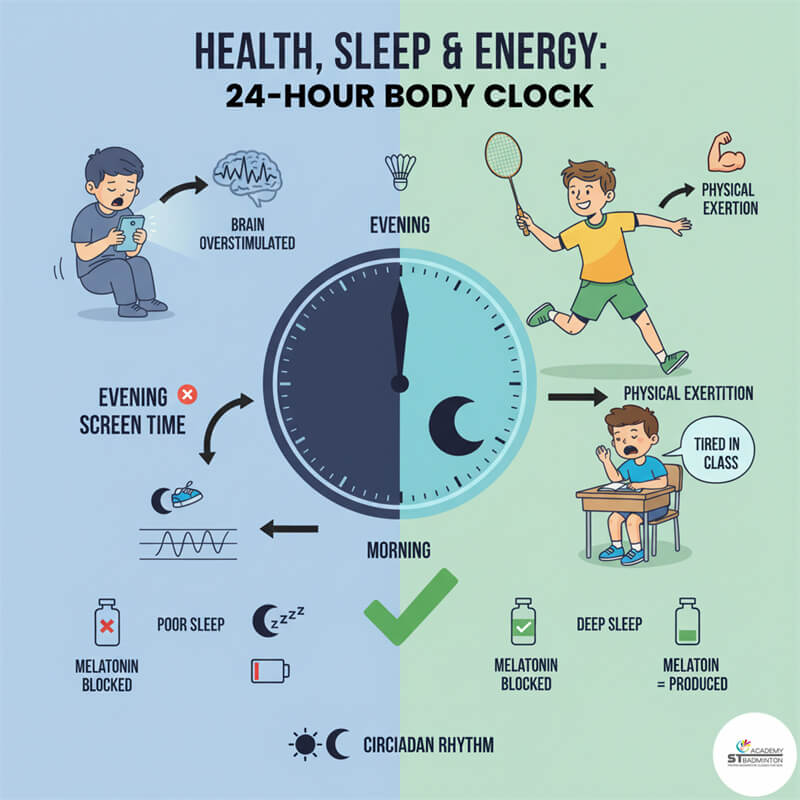
Health, Sleep & Energy
The Link Between Healthy Bodies and Active Minds
One of the simplest ways sport improves school results is through better sleep. Children who spend their evenings scrolling on phones often have trouble sleeping due to blue light and an overstimulated brain. In contrast, an evening training session helps them feel healthily tired, making it easier to fall asleep at a reasonable hour.
Better sleep directly leads to better attention and mood in the classroom the next day. A well rested child can concentrate for longer and is less likely to be irritable. Furthermore, establishing a training routine encourages better eating habits. Proper hydration and a simple, healthy meal after training are far better for a child’s development than late night snacking while watching videos.
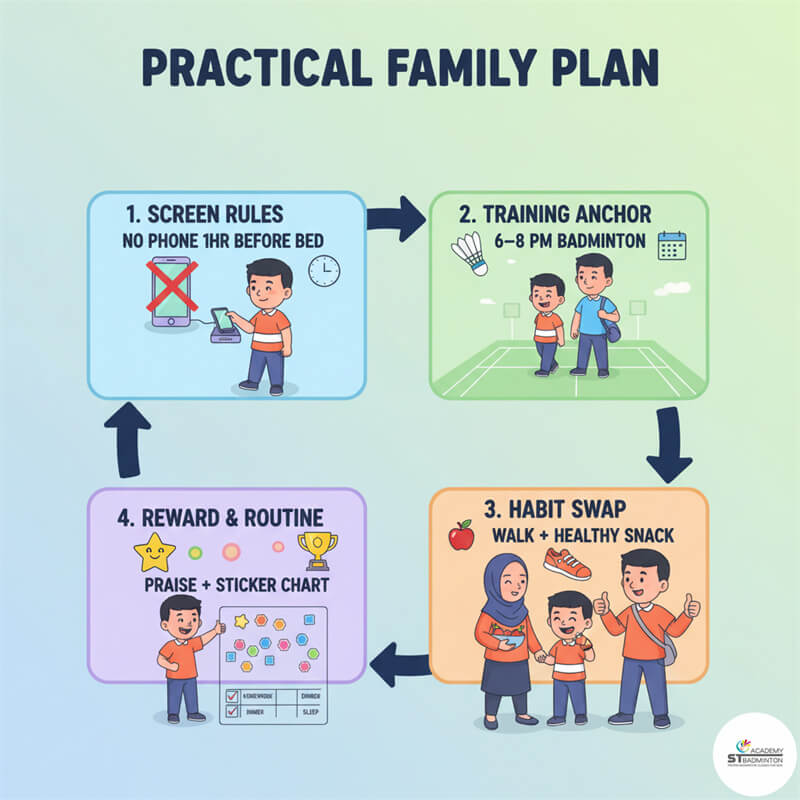
Practical Family Plan
Badminton vs Screen Time: A Simple Family Plan
Replacing screen time with sport requires a clear plan supported by the whole family. Here are four simple steps to get started:
1. Set Clear Screen Rules: Establish simple boundaries. For example, no phones are allowed during training sessions, at the dinner table, or for at least one hour before bedtime. Consistency is key.
2. Create Routine Anchors: Use training days to structure the evening. A fixed schedule of “training, dinner, homework, sleep” creates a predictable rhythm and leaves less idle time for scrolling. This is especially useful for families in Kepong or Selayang with busy schedules.
3. Swap Habits: Instead of the phone being the default activity, introduce small, positive swaps. A short walk and a healthy snack before training, or a 10-minute family chat after returning home, can break the cycle of reaching for a device.
4. Reward Progress: Acknowledge effort and consistency, not just match results. Praise your child for attending all their sessions, trying hard on a difficult drill, or finishing their homework on time after training. This reinforces the positive habits you want to build.
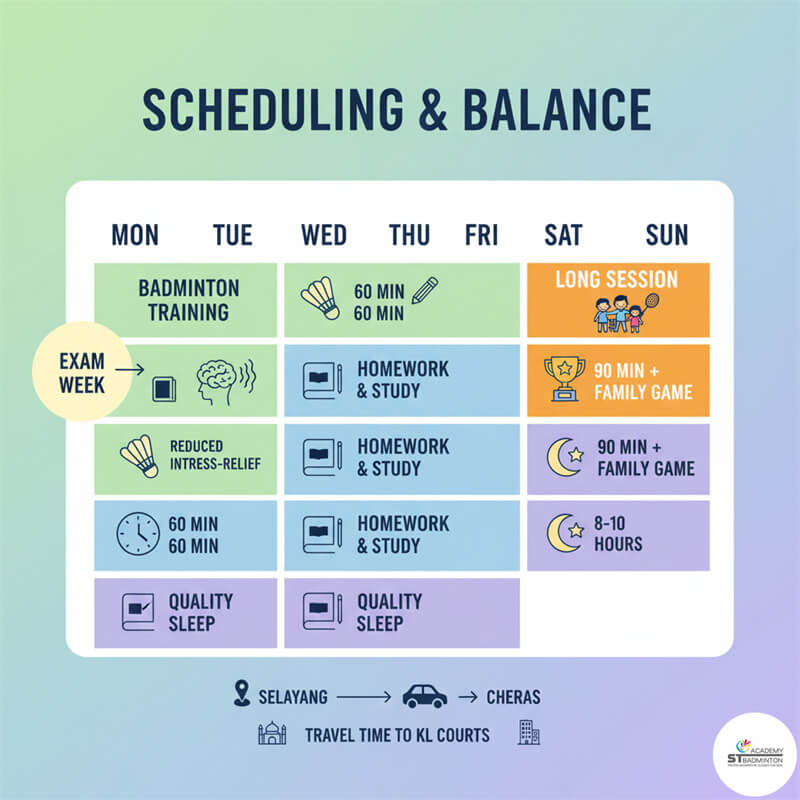
Scheduling & Balance
Balancing Training and Schoolwork for KL Families
A sustainable schedule is crucial for long term success. For families travelling from areas like Selayang or Air Panas, it’s important to be realistic. Avoid scheduling late night training sessions every day, as this can harm sleep and school performance. It is often better to choose a training centre that is reasonably close for weekday sessions, and reserve longer or more intense training for the weekends.
During busy exam weeks, it is a smart strategy to reduce the training volume but not stop completely. A light 60 minute session can be a great way to manage stress and take a productive break from studying. Good communication with your child’s coach is important. Let them know about upcoming exams so they can adjust the intensity accordingly. This balanced approach ensures that badminton remains a positive part of your child’s life, not a source of stress.
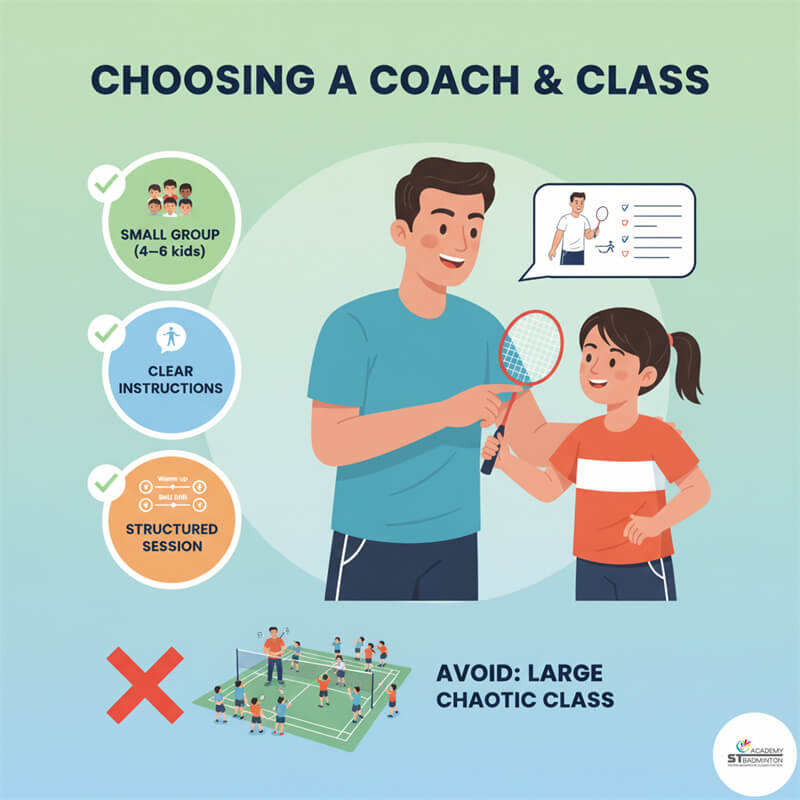
Choosing a Coach & Class
Finding a Class That Supports Good Study Habits
Not all coaching is the same. To get the focus and discipline benefits, look for a class with the right structure and coaching style. Parents from Cheras to Kepong should consider these points:
Class Size: Smaller groups mean more individual feedback for each child. This helps them learn faster and reduces frustration, which makes them more likely to stick with the routine.
Coach’s Style: A good coach for this purpose is patient and gives clear, simple instructions. They should focus on correcting technique in a positive way and can maybe suggest simple drills to practise at home.
Session Structure: Look for classes with a clear structure: a proper warm up, a core skill for the day, a short game based activity, and a quick cool down or reflection. This predictable format reinforces the idea of routine and discipline that helps with study habits.
FAQs: Badminton, Screen Time & Your Child’s Focus
Here are answers to common questions from Malaysian parents about using badminton to balance screen time and improve study habits.
How can badminton help reduce phone addiction?
Badminton helps reduce phone addiction by replacing passive screen time with an engaging, physical activity. It provides a structured routine that fills evenings, leaving less idle time for scrolling. The fast paced nature of the sport demands full attention, training a child’s focus away from digital distractions. The social interaction with coaches and peers also provides a healthy, real world alternative to online connections, making it a positive tool to reduce phone addiction with sports and build better habits.
What training schedule works for school nights in Kuala Lumpur?
For school nights, a balanced schedule is key for anyone seeking badminton for kids in Kuala Lumpur. Aim for sessions that end by 8:30 PM to allow time for dinner, a short study period, and adequate sleep. A schedule of two weekday sessions and perhaps one longer session on the weekend often works well. This provides consistency without overwhelming the child. For families in areas like Cheras or Air Panas, factoring in travel time is crucial to avoid late nights that affect school the next day.
Will training make my child too tired to study?
While intense training can be tiring, a well scheduled session often has the opposite effect. Physical activity boosts blood flow to the brain, which can actually improve focus and mental clarity for homework afterwards. The key is balance. A 90 minute session followed by a proper meal and a short break should leave a child feeling refreshed, not exhausted. It also promotes better sleep, which is essential for concentration in school. If your child is consistently too tired, the training load or schedule may need adjusting.
My child is shy can badminton improve social confidence?
Yes, badminton can be excellent for shy children. It provides a structured social environment where interaction is focused on the game, which is less intimidating than unstructured social settings. They will practise communicating with a coach and partners in a low pressure way. Celebrating a good shot with a teammate or simply being part of a group builds a sense of belonging. Over time, these small, positive interactions can significantly boost social confidence both on and off the court.
How many sessions per week for kids in Selayang or Kepong?
For children travelling from areas like Selayang or Kepong, two to three sessions per week is a realistic and effective goal. This frequency provides enough consistency to see progress without causing burnout from daily travel. A good schedule might involve two shorter weekday sessions at a nearby court, and a longer, more focused session on a weekend. This balances the need for practice with the practicalities of travel and school commitments, ensuring the badminton journey remains sustainable and enjoyable.
How long until we see better focus or study habits?
Improvements in focus and study habits are gradual and depend on consistency. While some parents notice better energy and mood within a few weeks, more significant changes in discipline and attention can take a few months. The key is a consistent routine of training, sleep, and home rules. Remember that badminton is a tool to support development; it works best when paired with parental guidance. The goal is long term habit formation, not an overnight fix. Patience and encouragement are essential.
Building Focus and Fun on the Court
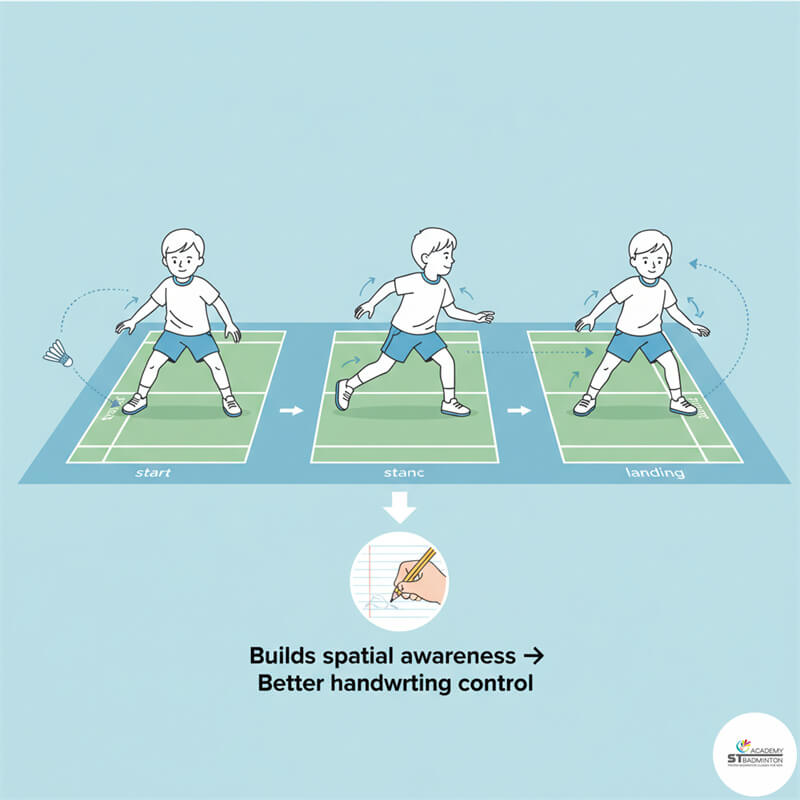
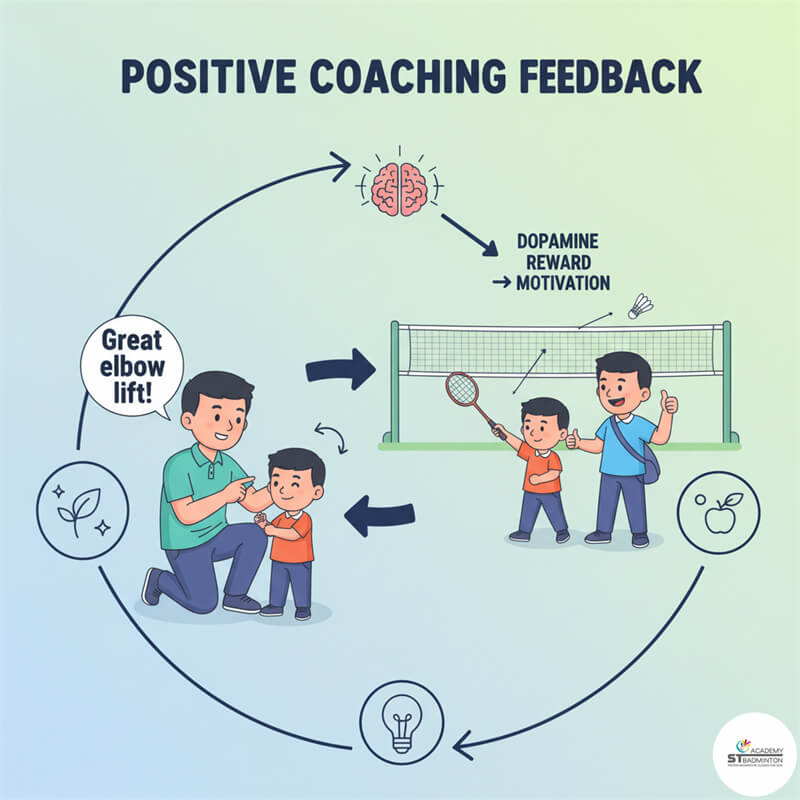
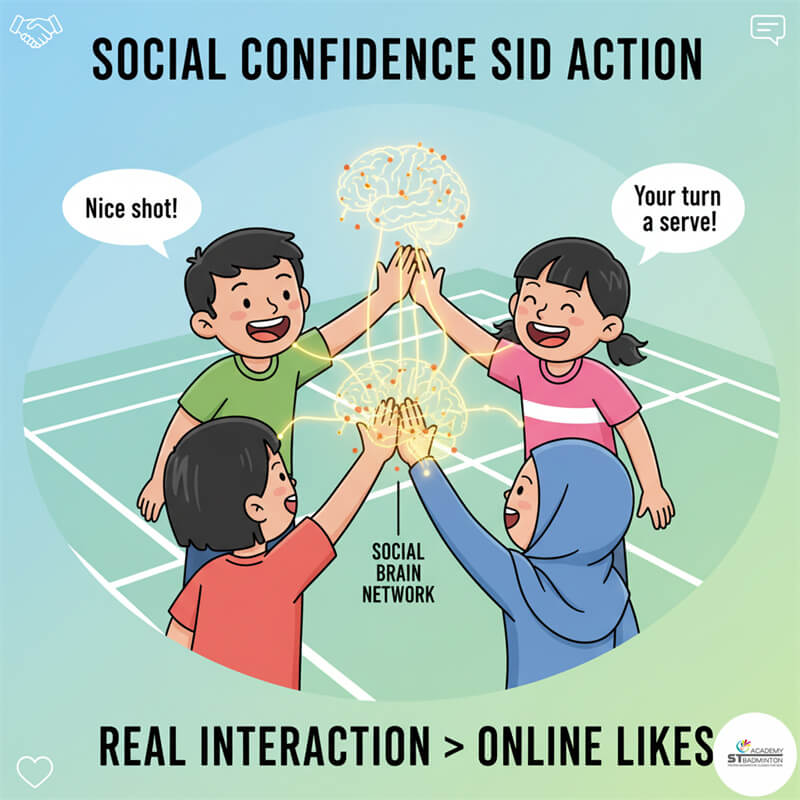
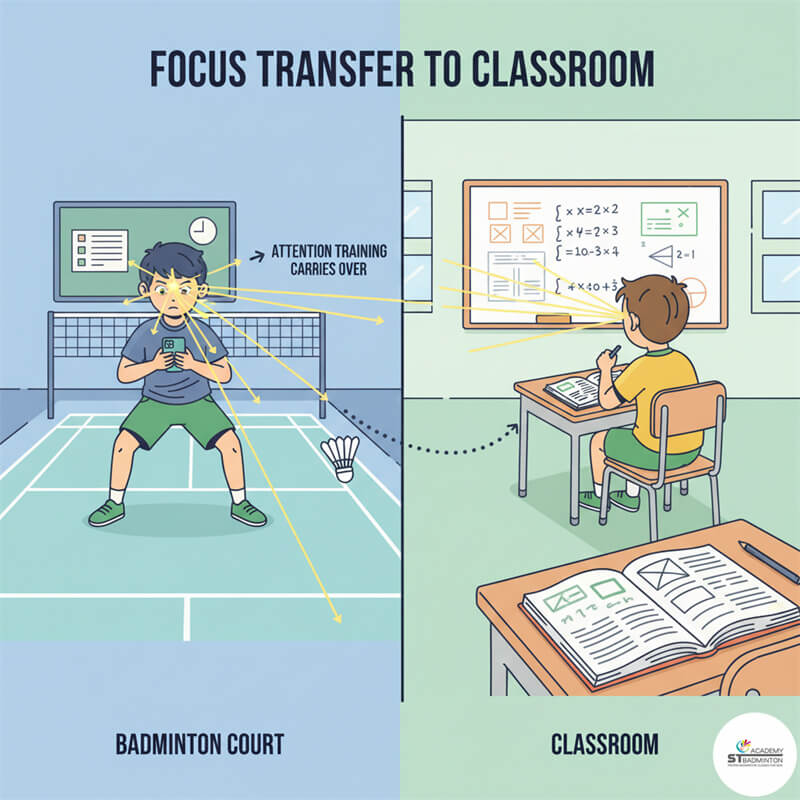
How Consistent Training Outweighs Screen Time
Choosing structured sport over passive screen time provides huge advantages for a child's long term development in focus, health, and confidence. Our approach helps build a solid foundation for a balanced and successful future.
| Development Area | Passive Screen Time (Videos, Games) | Active Badminton Training HEALTHY |
|---|---|---|
| Focus & Attention | Encourages short attention spans and passive consumption. Mindless scrolling weakens focus. | Demands sustained concentration on the shuttle, opponent, and court. Builds active listening skills. |
| Social Skills | Often an isolated activity. Can lead to weaker real-world communication skills. | Builds teamwork, communication, and sportsmanship in a group setting with peers and coaches. |
| Physical Health | Sedentary, contributing to poor posture and low energy levels. Can disrupt sleep patterns. | Improves cardiovascular health, coordination, and strength. Promotes better sleep and energy. |
| Problem Solving | Provides pre-packaged entertainment with little independent thought required. | Requires quick, strategic thinking to react to shots and plan the next move. Builds decision-making. |
| Emotional Resilience | Offers instant gratification. Avoids challenges, leading to low frustration tolerance. | Teaches how to handle mistakes, losses, and feedback, building true resilience and grit. |
| Study Habits & Routine | Disrupts routines with unstructured, endless content. Can lead to procrastination. | Creates a fixed schedule, teaching time management and discipline that apply directly to homework. |
| Parental Experience | Can be a source of conflict over time limits and content choices. | Parents can enjoy watching their child learn tangible skills and develop healthy habits. |
Ready to Build Better Habits? Beginner Badminton for Children in Kuala Lumpur
This guide shows how badminton training can be a powerful tool to build focus, confidence, and discipline while reducing unhealthy screen time. When you feel your child is ready to start building these positive habits, our academy is here to provide professional guidance. We offer structured badminton for kids in Kuala Lumpur, focusing on small group coaching for effective learning. If you're looking for kids badminton classes in Malaysia to support your child's development, contact us to learn more about schedules for families in areas like Setapak, Wangsa Maju, and Cheras.

